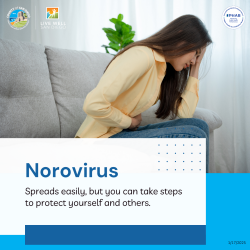Norovirus
Page last updated 12/3/2025.

Norovirus is a very contagious virus that causes vomiting and diarrhea. It is sometimes called the "stomach flu" or the "stomach bug."
People of all ages can get infected and sick with norovirus. In the United States, Norovirus is the most common infectious cause of vomiting and diarrhea. It is also the leading cause of foodborne illness.
On this page:

- Wash your hands often with soap and water for at least 20
seconds, especially:
- After using the toilet and changing diapers.
- Before eating, preparing, and handling food.
- Before giving yourself, or someone else, medicine.
- Hand sanitizer does not work well against norovirus. Hand sanitizer should not be used instead of handwashing.

- Regularly clean surfaces and objects in your home, especially
things that are touched frequently, like light switches, doorknobs,
and countertops.
- Clean and disinfect surfaces right away
after someone vomits or has diarrhea.
- Wear rubber, or disposable gloves, and wipe the entire area with paper towels. Throw the paper towels in a plastic trash bag.
- To disinfect, use a chlorine bleach solution or use an EPA-registered disinfecting product against norovirus.
- Wash laundry well, take out the trash, and wash your hands.
- Clean and disinfect surfaces right away
after someone vomits or has diarrhea.

- Handle and prepare food safely. Before preparing and eating
your food:
- Carefully wash fruits and vegetables.
- Cook oysters and other shellfish thoroughly to an internal temperature of at least 145°F.
- Routinely clean and sanitize kitchen utensils, cutting boards, counters, and surfaces, especially after handling shellfish.
- Keep raw oysters away from ready-to-eat food in the grocery cart, refrigerator, and on cutting boards.
- Throw away food that might contain norovirus.
A person can get norovirus by accidentally getting tiny particles of poop or vomit in their mouth from a person infected with norovirus. Norovirus spreads very easily and quickly in different ways, including:
- Having direct contact with someone who has norovirus. This includes caring for them, sharing food or eating utensils with them, or eating food handled by them.
- Eating food, drinking liquids, and/or touching objects or surfaces that are contaminated with norovirus.
People with norovirus should stay home until they no longer experience vomiting or diarrhea. They should not prepare food, or provide care for others, while they are ill and for at least 2 days after symptoms stop to avoid getting others sick.
A person usually develops symptoms 12 to 48 hours after being exposed to norovirus.
- Most common symptoms: Diarrhea, vomiting, nausea, and stomach pain.
- Other symptoms: Fever, headache, and body aches.
A doctor can determine if you are likely to have norovirus based on your symptoms alone. There is a stool test for norovirus but that is usually not needed.
There is no specific medicine to treat people with norovirus.
- Most people get better on their own within 1-3 days.
- Antibiotics will not help treat norovirus because they fight bacteria, not viruses.
- Drink plenty fluids to help prevent dehydration (loss of body fluids). This is very important for children, elderly, and people with weakened immune systems.
- Norovirus Cases Linked to Frozen Korean Oysters (April 16, 2024)
- County Expands Oyster-Linked Illness Investigation (January 18, 2024)
- County Investigating Illnesses Linked to Imported Oysters (January 11, 2024)
California Department of Public Health (CDPH)
For Healthcare Professionals
- California Health Alert Network (CAHAN) San Diego
-
Norovirus Toolkit
for Long-Term Care Facilities
- Best Practices: Control of Viral Gastroenteritis Outbreaks in Group Residence Facilities
- Cleaning and Disinfection
-
Case Log of
Residents and Staff with Acute Gastrointestinal
Illness
- Print and complete this log electronically. The data entered in the electronic version cannot be saved without Adobe Acrobat Standard. You can request a fillable Microsoft Word version from the Epidemiology Unit.
- Recommendations for the Prevention and Control of Viral Gastroenteritis Outbreaks in California Long-Term Care Facilities (October 2006)
Suggested Messaging
English
Norovirus spreads easily and causes vomiting and diarrhea. Protect
yourself and your loved ones by washing your hands with soap and
water, keeping things clean, and handling and preparing food
safely.
Call the Epidemiology Unit at (619) 692-8499, or send an e-mail, for more information.







